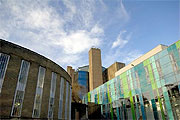Source: London School of Hygiene and Tropical Medicine Archive, PL-12341
Notable People
Robert Thomson Leiper
-
Robert Thomson Leiper

-
Robert Thomson Leiper

Source: London School of Hygiene and Tropical Medicine Archive, PL-12311
-
Robert Leiper's matriculation record, 1903

Source: University of Glasgow
-
Robert Leiper DSc Thesis 1911

Source: University of Glasgow
Helminthologist
Born 17 April 1881, Kilmarnock, Scotland.
Died 21 May 1969.
The father of modern helminthology.
Connection to the University of Glasgow: Alumnus, Honorary Graduate
GU Degrees: MB ChB, 1904; DSc, 1911; MD, 1917; LLD, 1955;
Discover more Helminthologist on the University of Glasgow Story website
Achievements
The following achievement is associated with Robert Thomson Leiper:
Discovery and understanding of types of parasitic worms
Robert Leiper made lasting contributions to our understanding of the biology and taxonomy of parasitic worms infecting humans and animals.
Honours
The following honours are associated with this person:
Biography
Robert Thompson Leiper was a Glasgow graduate and a distinguished helminthologist who made ground-breaking discoveries about parasitic worms.
Leiper was born in Kilmarnock in 1881 and educated at Warwick School and Mason University College, Birmingham. He then began his studies at Glasgow University's medical school, graduating with an MB ChB in 1904. His interests were in research and he won a Carnegie scholarship in Biology. His focus was firmly on helminthology, a subject in which he became the first lecturer at the London School of Tropical Medicine in 1905.
He travelled extensively. In 1906-07, while working under Arthur Looss in Cairo, he became interested in the human blood-fluke Schistosoma, the cause of bilharzias, a disease endemic in the Nile Delta. Leiper's major research enabled him to unravel the complexities of its lifecycle and show that there were two schistosomes in Egypt, each with a different lifecycle.
He continued to accumulate Glasgow degrees, DSc in 1911 and an MD with Honours in 1917. In 1919 he was appointed Professor of Helminthology at the London School of Tropical Medicine and in 1924 director of the Department of Parasitology. He was elected FRS in 1923 and FRCP in 1936, and he was appointed CMG in 1941. In 1955 he received an Honorary LLD from the University of Glasgow. Other prestigious honours included the Mary Kingsley medal of the Liverpool School of Tropical Medicine and the Bernard Nocht medal from the Tropeninstitut in Hamburg. He died on 21 May 1969 in St. Albans.

